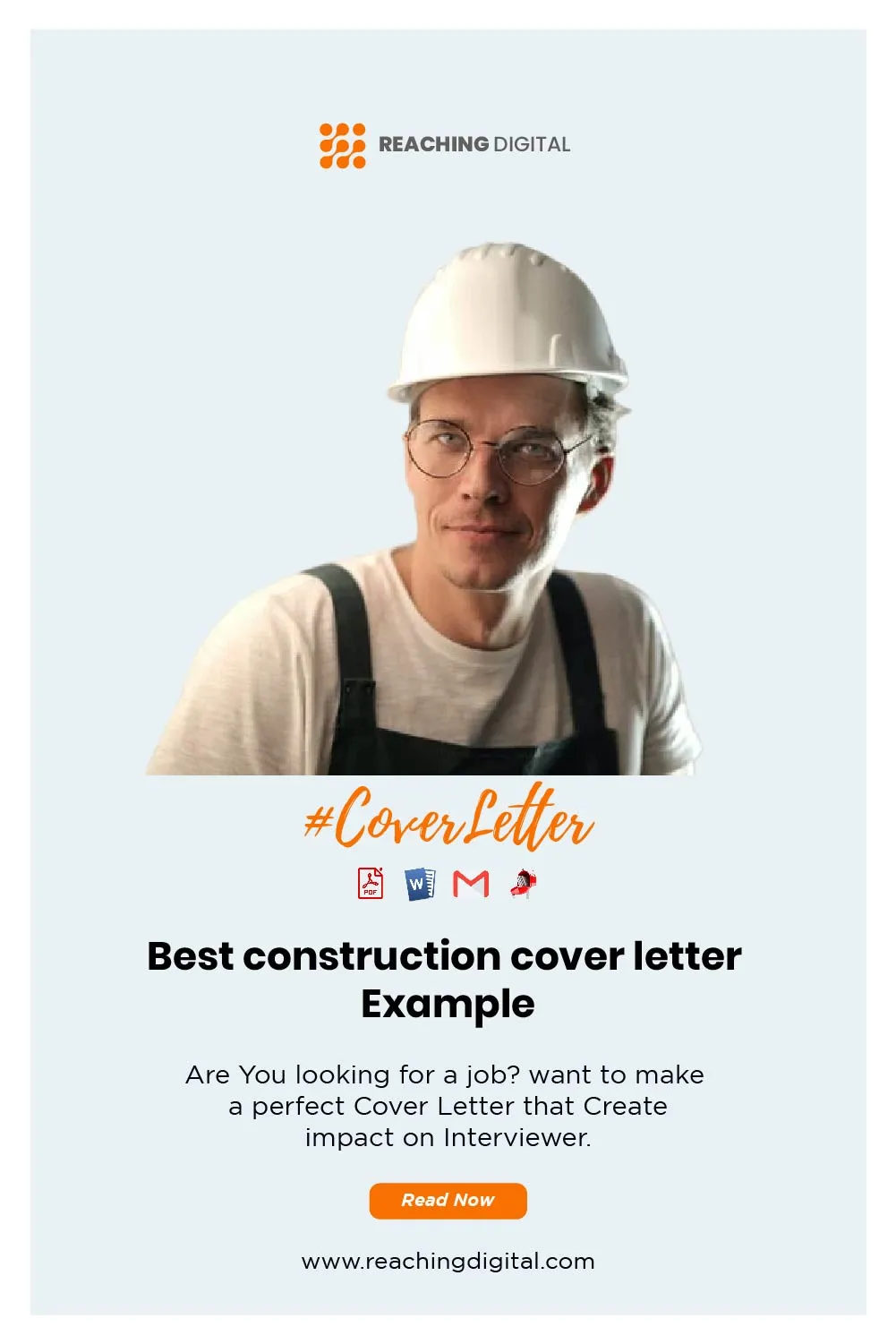What is a Construction Cover Letter (And Why You Need One)
A construction cover letter is a crucial document that accompanies your resume when applying for jobs in the construction industry. It serves as your first point of contact with a potential employer, providing an opportunity to introduce yourself, highlight your qualifications, and express your interest in the specific position. In a competitive field like construction, a well-crafted cover letter can set you apart from other candidates and significantly increase your chances of landing an interview. It’s a chance to showcase your personality, work ethic, and understanding of the construction landscape, going beyond the basic information presented in your resume. The cover letter is the place to let your potential employer know that you’re excited about the job.
The Importance of a Construction Cover Letter
The importance of a construction cover letter cannot be overstated. It allows you to personalize your application, tailoring it to the specific requirements and preferences of the hiring company. This personalization demonstrates your genuine interest in the role and the organization. Moreover, a cover letter provides a platform to elaborate on your skills and experiences, offering context and depth that a resume alone cannot convey. You can use it to explain gaps in your employment history, showcase your soft skills (like teamwork and communication), and demonstrate how your qualifications align with the company’s values and goals. It also serves as a reflection of your communication skills, attention to detail, and professionalism. A strong cover letter highlights your strengths and makes a compelling case for why you are the perfect fit.
Key Elements of a Successful Construction Cover Letter
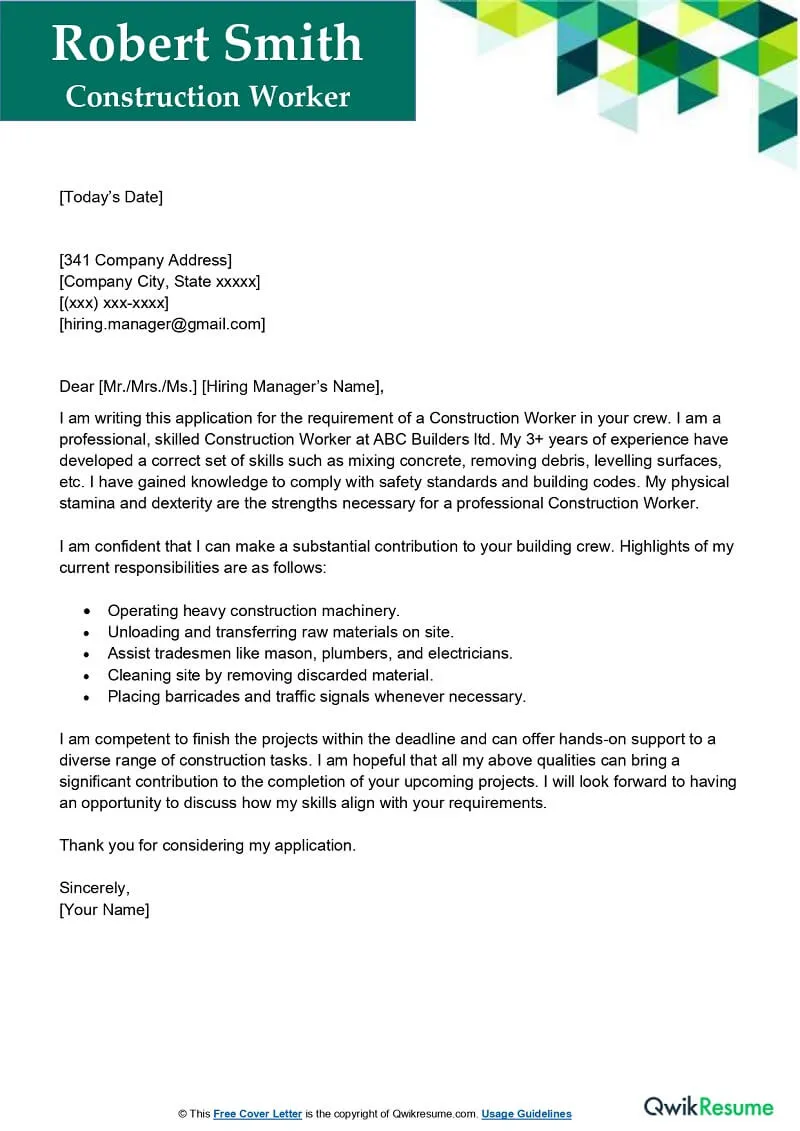
A successful construction cover letter contains several key elements that work together to make a strong impression on the hiring manager. From the header to the closing, each component contributes to the overall effectiveness of your application. Focusing on these elements ensures your letter is clear, concise, and compelling, increasing your chances of getting an interview. Let’s break it down, detailing each element and how to properly write it. The key to a successful cover letter is showcasing your value, tailoring to the specific job and company, and adhering to professional standards.
Header and Contact Information
The header of your construction cover letter should include your full name, address, phone number, and professional email address. This information should be clearly displayed and easy to find. Include the date and the hiring manager’s name and title if you have it. Always use a professional email address to ensure your application is taken seriously. The header sets the professional tone and ensures the hiring manager can easily contact you. Use a professional font and layout to make the header visually appealing and easy to read. Correct formatting makes a great first impression, so double-check everything.
Professional Greeting
The greeting should be formal and professional. If you know the hiring manager’s name, use “Dear Mr./Ms./Mx. [Last Name].” If the name is unavailable, use “Dear Hiring Manager” or “Dear [Company Name] Hiring Team.” Avoid generic greetings like “To Whom It May Concern,” as they can make your letter seem impersonal. The greeting is the first impression, so make it appropriate and respectful. Researching the company and finding the hiring manager’s name shows initiative and attention to detail. Using the correct greeting demonstrates respect and professional communication.
Opening Paragraph (Grab Attention)
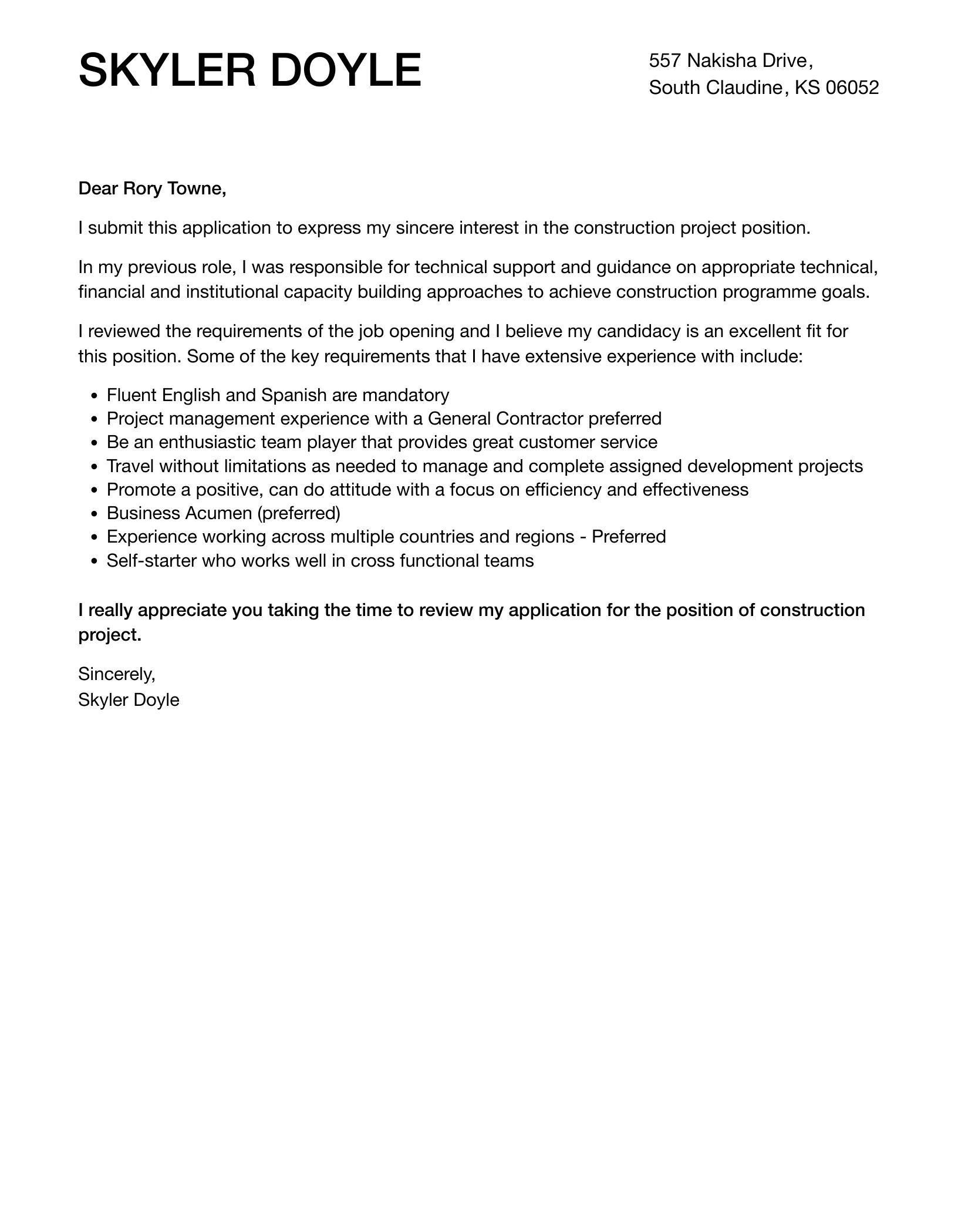
The opening paragraph is critical because it grabs the reader’s attention and immediately establishes your purpose. Start by stating the position you are applying for and how you learned about it. Briefly mention your most impressive qualification or a key skill that aligns with the job requirements. Aim to create an immediate positive impact, setting the stage for your entire letter. A compelling opening makes the reader want to learn more, and gives a good first impression of your work ethic. Keep it concise and impactful, using strong language that highlights your suitability. For example, “I am writing to express my strong interest in the Project Manager position at [Company Name], as advertised on [Platform]. With over ten years of experience in managing large-scale construction projects, I am confident I can significantly contribute to your team.”
Highlighting Your Skills and Experience
The body of your cover letter should highlight your skills and experiences that are relevant to the job description. Focus on specific achievements and how they align with the company’s needs. Use action verbs to describe your responsibilities and accomplishments. Provide concrete examples to demonstrate your abilities. For example, instead of saying “Managed projects,” state “Successfully managed and completed 5 construction projects, on time and within budget, including a $10 million commercial building.” Mention any certifications, licenses, or specialized training that is relevant to the position. Keep the focus on what you can bring to the company, emphasizing the value you provide. Tailor your skills to the specific requirements of each job and be specific with your accomplishments.
Quantify Your Achievements
Quantifying your achievements adds credibility and impact to your cover letter. Use numbers and data to demonstrate the results of your work. For instance, “Increased project efficiency by 15% through the implementation of new project management software.” or “Managed a team of 20 construction workers, consistently meeting deadlines and exceeding quality standards.” Providing measurable results showcases your ability to deliver tangible outcomes. This approach makes your accomplishments more compelling and memorable to the hiring manager. The hiring manager will see your achievements as more credible and will be able to grasp the impact you will have on their company.
Tailoring to the Job Description
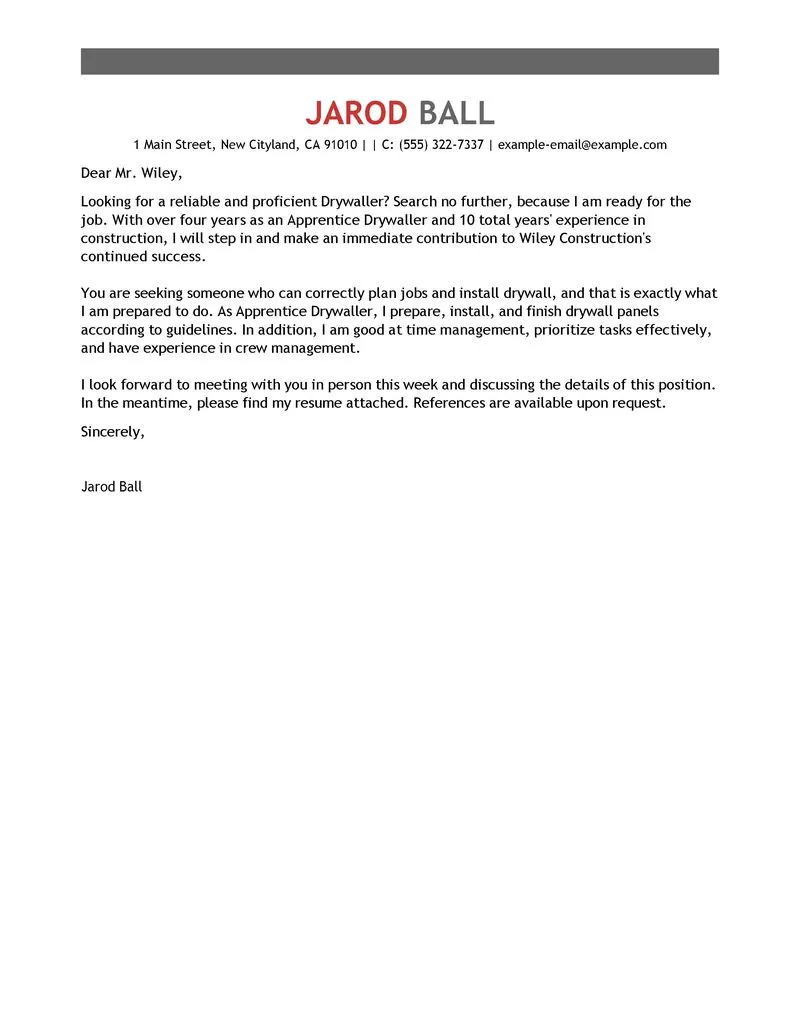
Customizing your cover letter to match the job description is essential. Carefully read the job posting and identify the key requirements and qualifications the employer is seeking. Then, address those requirements in your cover letter, using the same keywords and phrases from the job description. This demonstrates that you understand the role and possess the necessary skills. Highlighting how your skills and experience align with these requirements shows the hiring manager that you are a strong candidate. By tailoring your letter, you increase the chances of getting noticed. Be sure to demonstrate your clear interest in the job.
Showcase Relevant Projects
Include specific examples of projects you have worked on, especially those that are relevant to the job you’re applying for. Briefly describe the projects, your role, and your key contributions. Highlight any significant challenges you overcame and the successful outcomes you achieved. This demonstrates your practical experience and ability to perform the job duties. Give the hiring manager a clear picture of your experience and potential. Provide details such as the project type, size, and any notable achievements. It is important that you relate your work to the tasks you will be undertaking in the job you are applying for.
Express Enthusiasm and Company Alignment
Expressing your enthusiasm for the company and the role is important. Research the company and its values to demonstrate your genuine interest. Mention specific aspects of the company’s work or culture that resonate with you. Explain why you are excited about the opportunity to contribute to their team. Highlighting your alignment with the company’s mission and values increases your chances of making a positive impression. Expressing your enthusiasm will show the hiring manager you are serious about the job and will be a great addition to the company. This may include a positive comment on a specific project or the company’s reputation.
Closing Paragraph and Call to Action
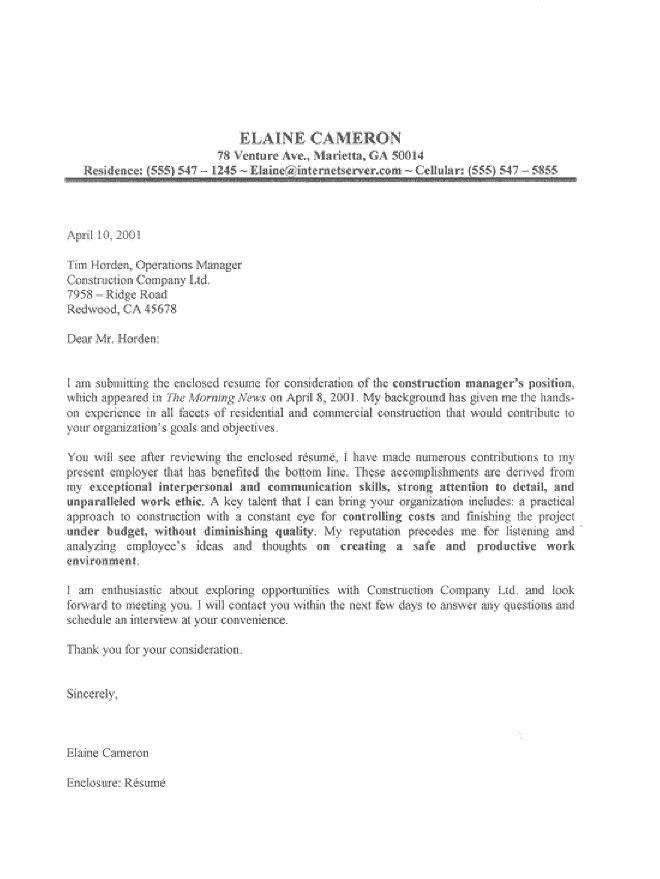
The closing paragraph should summarize your key qualifications and reiterate your interest in the position. Include a clear call to action, such as “I am eager to discuss my qualifications further in an interview” or “I look forward to hearing from you soon.” Thank the hiring manager for their time and consideration. The closing reinforces your interest and makes it easier for the hiring manager to take the next step. A concise and confident closing paragraph leaves a lasting positive impression. Always express gratitude for their time. The goal is to make it easy for the hiring manager to reach out to you.
Formal Closing and Signature
Use a professional closing such as “Sincerely,” “Regards,” or “Best regards.” Leave space for your signature if you are printing and mailing the cover letter. If submitting electronically, type your full name below the closing. A formal closing demonstrates professionalism. Ensure your signature is neat and legible if you are printing the document. Maintain consistency in your formatting and professional tone throughout the cover letter. Choose a closing that is appropriate for the level of formality of the job.
Proofreading and Formatting
Proofread your cover letter carefully for any grammatical errors, typos, or inconsistencies. Ensure that the formatting is clean, consistent, and easy to read. Use a professional font, such as Times New Roman, Arial, or Calibri, with a font size between 10 and 12 points. Check the spacing, margins, and overall layout. A well-formatted cover letter with no errors shows attention to detail and professionalism. Proofreading is a critical step to ensure your application is polished and ready to be read. Ensure your contact information is up to date. The overall impression is just as important as the content.
Common Mistakes to Avoid
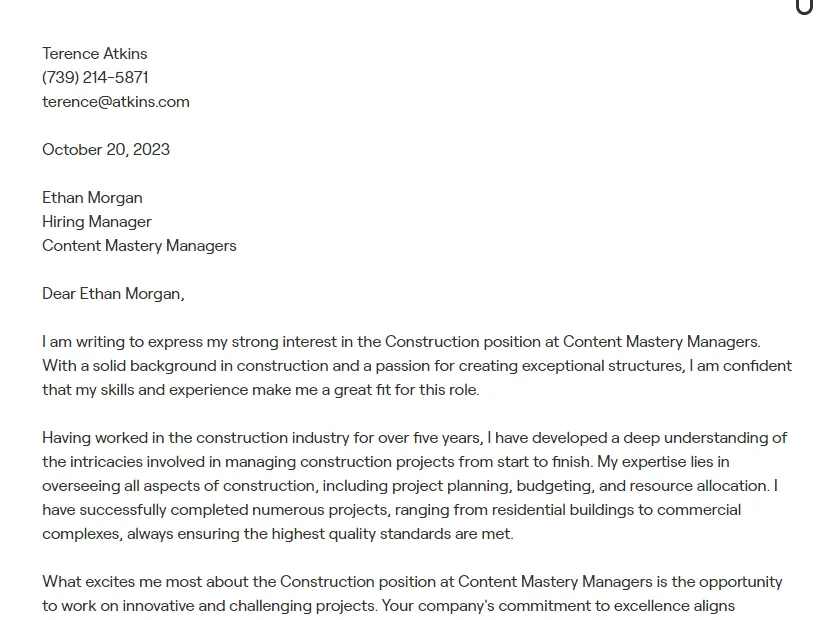
Avoid common mistakes such as typos, grammatical errors, and generic content. Do not use excessive jargon or overly casual language. Refrain from including irrelevant information. Don’t just rehash your resume; add context and detail. Ensure you don’t use a template without customizing it to the specific job. Avoid negative comments about previous employers or jobs. Pay attention to detail to avoid mistakes. Take the time to write a tailored, well-crafted cover letter that highlights your qualifications and shows your genuine interest in the role. Proofread to ensure there are no errors.
Length and Tone
Keep your cover letter concise and focused, ideally within one page. Use a professional and confident tone throughout the letter. Be enthusiastic, but avoid sounding overly familiar or informal. Focus on being clear, professional, and demonstrating that you are excited for the job. The tone should reflect your personality and fit the company culture. Make sure your enthusiasm comes across, but keep it professional. The overall length should be enough to let the hiring manager know you are a good fit, but not too long that it becomes boring.
Using Keywords
Incorporate relevant keywords from the job description throughout your cover letter. This helps the hiring manager quickly identify your qualifications and ensures your application gets past any applicant tracking systems. Read the job description carefully, noting key skills and requirements. Use these words naturally within your sentences, without making the letter sound forced or unnatural. Keywords can make your application much more visible and will show the hiring manager you have read the job description thoroughly. This is essential to helping your application get selected.
Construction Cover Letter Examples
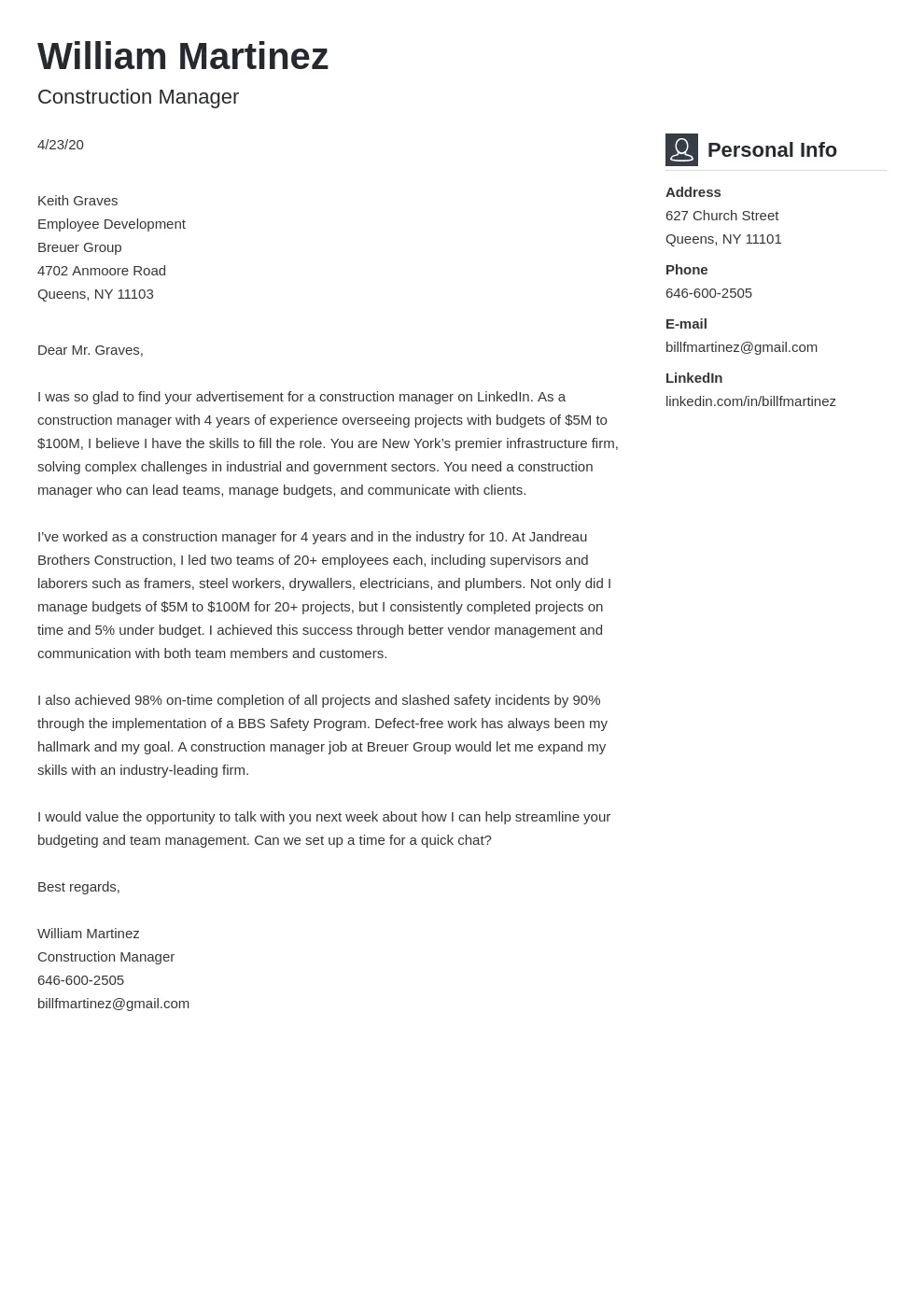
Reviewing examples of construction cover letters can provide valuable insights and inspiration. Look for examples tailored to the specific roles you are applying for, such as project manager, site supervisor, or construction worker. Analyze how other candidates have highlighted their skills, experiences, and achievements. Pay attention to the formatting, language, and overall tone. Use these examples as a guide to create your own unique and compelling cover letter, tailoring it to your qualifications and the specific job requirements. Consider examples available online or from career services.
Entry-Level Cover Letter
For entry-level positions, focus on your educational background, relevant coursework, internships, and any related skills or experiences. Highlight your enthusiasm and willingness to learn. Showcase any projects or volunteer work where you gained experience in the construction field. Emphasize your strong work ethic, attention to detail, and eagerness to contribute to the team. Mention any certifications or training you’ve completed. Make sure to provide your skills while also expressing your willingness to learn and grow. Make a great impression on the hiring manager, emphasizing how excited you are about starting your career.
Experienced Professional Cover Letter
For experienced professionals, focus on your proven track record of success and specific accomplishments. Quantify your achievements with data and metrics. Highlight projects you have managed, the challenges you overcame, and the results you delivered. Showcase your leadership skills, project management expertise, and technical proficiency. Emphasize how your skills and experience align with the job requirements and the company’s needs. Provide specific examples of your work. Your letter should highlight your leadership experience and how you have improved the performance of previous construction projects.
Cover Letter for Project Manager
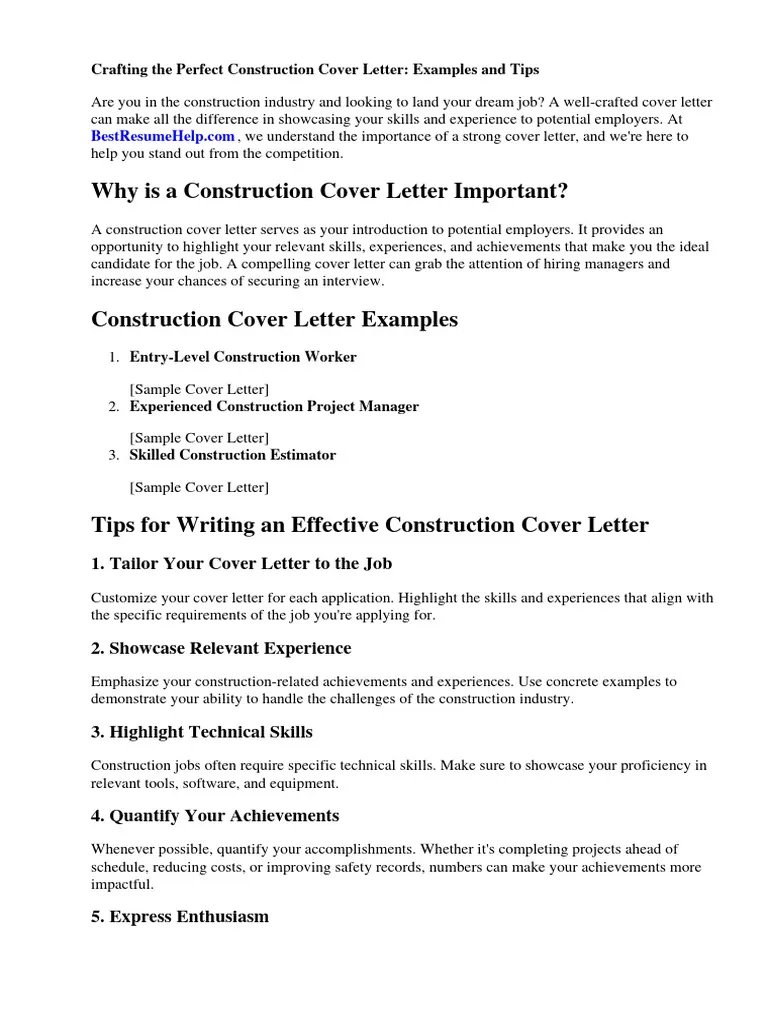
When applying for a Project Manager role, highlight your project management experience, including planning, budgeting, scheduling, and team leadership. Showcase your ability to manage projects from start to finish, ensuring they are completed on time and within budget. Mention your experience with relevant software and tools. Provide examples of successfully completed projects and the positive outcomes you achieved. Focus on your communication, problem-solving, and decision-making skills. Provide information about the type of projects you have worked on, for example, commercial, residential, or industrial. Make sure the hiring manager knows you are the right person to handle the responsibilities of the job.
Cover Letter for Site Manager
If applying for a Site Manager position, emphasize your experience in overseeing construction sites, managing crews, and ensuring safety regulations are followed. Highlight your organizational and leadership skills. Mention any experience with project scheduling, quality control, and problem-solving on site. Show that you have a thorough knowledge of construction practices. Demonstrate your ability to manage multiple tasks and meet deadlines. Provide examples of how you have successfully managed construction sites and ensured projects were completed safely and efficiently. Highlight your skills and how you handle construction sites.
Additional Tips for a Strong Cover Letter
Formatting and Design
Choose a clean and professional design. Use a standard font, such as Arial or Times New Roman, and a font size of 10-12 points. Keep the layout easy to read with clear headings, bullet points, and adequate spacing. Use a simple and consistent style. A well-formatted cover letter is visually appealing and easy to read. Proper formatting ensures a great first impression. The use of white space makes the cover letter easier on the eyes. Be sure the format makes it easy for the hiring manager to read all the information provided.
Following Up After Submission
After submitting your cover letter and resume, follow up with the hiring manager or company to express your continued interest in the position. Send a brief email or make a phone call within a week or two of submitting your application. Thank them for their time and reiterate your enthusiasm for the opportunity. This follow-up demonstrates your proactive attitude and commitment. It can also provide you with a chance to inquire about the status of your application. This follow-up will show your interest and willingness to do what it takes to land the job. This is a great time to reinforce your qualifications and let the hiring manager know you want the job. Remember to be professional and courteous.
